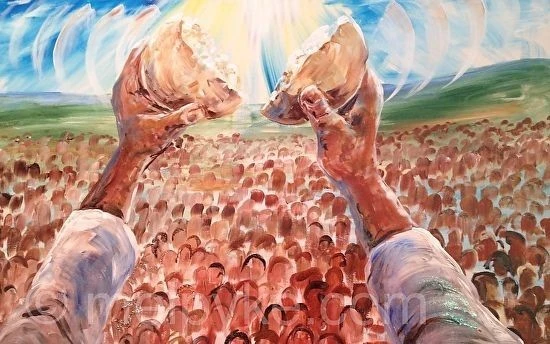Jijo Kandamkulathy, CMF
Claretian Publications, Macau
Jn 6:24-35
18th Sunday in Ordinary Time – Year B
Gospel Reflection
We are continuing the discourse on the bread of life from last Sunday. Today, the people have caught up with Jesus and the disciples who had slipped away to the other side of the lake after feeding the five thousand. The miracle of the loaves began with the Lord noticing that people were hungry. Matthew narrates (Matt: 15 29-39) that Jesus was concerned about people ‘falling’ on the way if they were sent away hungry. Reading ‘falling’ as a ‘physical fall’ is missing the point altogether. Hunger could make people do things that they would not otherwise do, make them fall from their usual goodness and grace.
In Victor Hugo’s novel, Les Misérables, Jean Valjean was caught stealing food for his hungry family. He was a good man who was forced into stealing by the hunger of his family. A similar story was played out recently in Italy. A 2016 verdict in the Italian Supreme Court had opened the eyes of many legal systems. Roman Ostriakov, a Ukrainian refugee, had stolen some food worth less than 5 euros. The lower court convicted him of six months imprisonment and 100 Euros fine! Sometimes, our legal systems are so primitive that they do not even match eye for eye standards. The compensation asked for is many times over the value of the lost property. In this case, the Supreme Court quashed the issue and said that the right to survival is greater than the property right. If a poor man steals food, it is his right. Poverty and hunger can push people to do untold atrocities. They will fall. And we are responsible.
The bread that Jesus gave was more than food and calories. All feeding is more than the calories of the bread. There is a story of a little boy raised by his elder brother after they lost their parents. When the boy returned home from a poor hostel for his summer holidays, his sister-in-law gave him a sumptuous meal. He kept eating until all the rice cooked for three people got over. Then, he kept saying he was still not satisfied. The bewildered woman reported the matter to her husband. He went and sat with the boy. Took two remaining grains of rice at the rim of the plate and fed ever so tenderly into his mouth. The boy burped and said, “now I am full.” The boy was satisfied when he was assured of the love in the food.
Jesus fed the people like the brother fed the boy. After having their fill, however, the people were no more in need of the love that the sharing represented. They are after the business of bread. When love is separated from food, it becomes a profit-making endeavor, a business, and they sought for Jesus like a rich bread wholesaler who gave away bread for free. It is estimated that in those days – even now – in most parts of the world, 85% of the income is spent on bread. If they can get bread freely, they can save some work. The woman at the well made that argument very openly. “Give me the water that will never make me thirsty again; I do not have to come for drawing water!” (Jn. 4: 15) This is profitable, a business!
Knowing why the people are catching up with him, Jesus invites them for a reformation of their mindset. In the beginning, they had gathered around him to listen to the word of God. Then, they were fed with bread too. Now the people are in search of bread and might be willing to tolerate some preaching! The priorities have changed. Jesus tells them, the bread that will never make them hungry again is the bread from heaven. It is this bread that they should be seeking. Then, he makes the solemn pronouncement, “I am the bread of life.” Jesus is not speaking about the Eucharist yet. He is speaking about the Word of God. He invites them to believe in the Word of God made flesh.


 Follow
Follow


